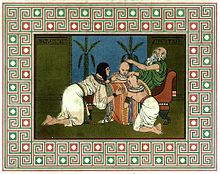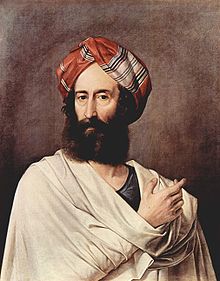Ephraim


Ephraim /ˈiːfriːəm/;[1] (Hebrew: אֶפְרַיִם/אֶפְרָיִם, Standard Efráyim Tiberian ʾEp̄ráyim/ʾEp̄rāyim) was, according to the Book of Genesis, the second son of Joseph and Asenath. Asenath was an Egyptian woman whom Pharaoh gave to Joseph as wife, and the daughter of Potipherah, a priest of On. (Genesis 41:50–52) Ephraim was born in Egypt before the arrival of the children of Israel from Canaan. (Genesis 48:5)
Ephraim had sons: Shuthelah, Beker, and Tahan. However, 1 Chronicles 7 claims that he also had two more sons, Ezer and Elead, who were killed by local men who came to rob him of his cattle. He then had another son, Beriah, who carried on his name. (1 Chronicles 7:20–23) From him was descended Joshua, son of Nun, who in time became the leader of the Israelite tribes in the conquest of Canaan. (1 Chronicles 7:20–27)
According to the biblical narrative, Jeroboam, who became the first king of the Northern Kingdom of Israel, was also from the house of Ephraim. (1 Kings 11:26)
Biblical criticism
Due to this lack of identity some Biblical scholars view this as postdiction, an eponymous metaphor providing an aetiology of the connectedness of the tribe to others in the Israelite confederation.[2] The text of the Torah argues that the name of Ephraim, which means double fruitfulness, refers to Joseph's ability to produce children, specifically while in Egypt (termed by the Torah as the land of his affliction).[3] Some scholars link the name to an Egyptian meaning rather than a Hebrew one.[4]
In the Biblical account, Joseph's other son is Manasseh, and Joseph himself is one of the two children of Rachel and Jacob, the other being Benjamin. Biblical scholars regard it as obvious, from their geographic overlap and their treatment in older passages, that originally Ephraim and Manasseh were considered one tribe - that of Joseph.[5] John's Book of Revelation, however, accords only Ephraim the tribal name of Joseph. According to several biblical scholars, Benjamin was originally part of the suggested Ephraim-Manasseh single "Joseph" tribe, but the biblical account of Joseph as his father became lost.[5][6] A number of biblical scholars suspect that the distinction of the Joseph tribes (including Benjamin) is that they were the only Israelites which went to Egypt and returned, while the main Israelite tribes simply emerged as a subculture from the Canaanites and had remained in Canaan throughout.[6][7] According to this view, the story of Jacob's visit to Laban to obtain a wife originated as a metaphor for this migration, with the property and family which were gained from Laban representing the gains of the Joseph tribes by the time they returned from Egypt;[6] according to textual scholars, the Jahwist version of the Laban narrative only mentions the Joseph tribes, and Rachel, and doesn't mention the other tribal matriarchs whatsoever.[7][8]
In the Torah, the eventual precedence of the tribe of Ephraim is argued to derive from Jacob, blind and on his deathbed, blessing Ephraim before Manasseh.[3][9] The text describing this blessing features a hapax legomenon - the word שכל (sh-k-l) - which classical rabbinical literature has interpreted in esoteric manners;[5] some rabbinical sources connect the term with sekel, meaning mind/wisdom, and view it as indicating that Jacob was entirely aware of who he was actually blessing;[9] other rabbinical sources connect the term with shikkel, viewing it as signifying that Jacob was despoiling Manasseh in favour of Ephraim;[9] yet other rabbinical sources argue that it refers to the power of Jacob to instruct and guide the holy spirit.[9] In classical rabbinical sources, Ephraim is described as being modest and not selfish.[5] These rabbinical sources allege that it was on account of modesty and selflessness, and a prophetic vision of Joshua, that Jacob gave Ephraim precedence over Manasseh, the elder of the two;[9] in these sources Jacob is regarded as being sufficiently just that God upholds the blessing in his honour, and makes Ephraim the leading tribe.[9]
See also
In the book of Revelation the Tribe of Joseph represents the other children of Joseph after Manasseh and Ephraim. Manasseh was made equivalent to a son of Jacob/Israel by Jacob himself at the end of the Book of Genesis. In the Book of Ezekiel, God grafted the Tribe of Ephraim to the Tribe of Judah, so in the Book of Revelation, The Tribe of Ephraim is represented by the Tribe of Judah by graft. The only Tribe of Israel not represented in the Book of Revelation is the Tribe of Dan.
Citations
- ^ "Ephraim". Merriam-Webster.com Dictionary. Merriam-Webster.
- ^ Peake's commentary on the Bible
- ^ a b Genesis 41:52
- ^ Shlomo (2009-03-24). "The Jewish History Channel: The Significance of Given Names in Tanach, Part 1". Ha-historion.blogspot.com. Retrieved 2013-08-09.
- ^ a b c d Jewish Encyclopedia
- ^ a b c Peake's commentary on the Bible
- ^ a b Israel Finkelstein, The Bible Unearthed
- ^ Richard Elliott Friedman, Who Wrote the Bible?
- ^ a b c d e f Genesis 48:1
 This article incorporates text from a publication now in the public domain: Easton, Matthew George (1897). "Ephraim". Easton's Bible Dictionary (New and revised ed.). T. Nelson and Sons.
This article incorporates text from a publication now in the public domain: Easton, Matthew George (1897). "Ephraim". Easton's Bible Dictionary (New and revised ed.). T. Nelson and Sons.
